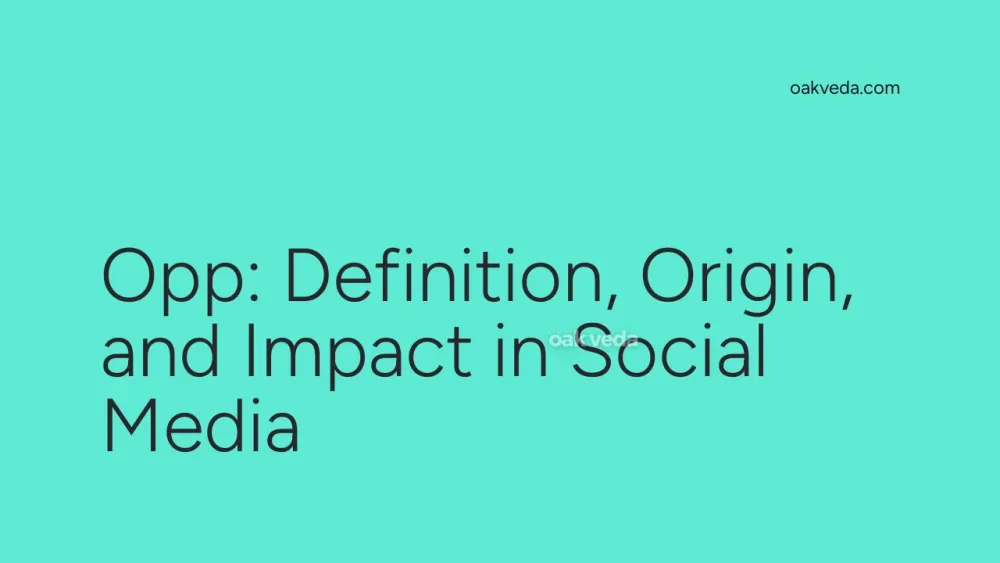
What is Opp?
"Opp" is a popular slang term used extensively in social media and online conversations. It's an abbreviation of "opponent" or "opposition," typically referring to someone considered an adversary, rival, or enemy. The term has gained significant traction in recent years, particularly among younger users on platforms like Twitter, Instagram, and TikTok.
Origin and Development of Opp
The term "opp" originated in hip-hop and rap culture, where it was initially used to describe rival artists, crews, or individuals with whom there was a competitive or confrontational relationship. Over time, its usage has expanded beyond the music scene and into broader social media vernacular.
The exact timeline of when "opp" entered mainstream social media usage is unclear, but its popularity has surged since the mid-2010s. The term's brevity and versatility have contributed to its widespread adoption across various online communities.
How Opp Works in Social Media
In social media contexts, "opp" is used in several ways:
- As a noun: Referring to someone as an "opp" identifies them as an adversary or someone with opposing views.
- As a verb: "Opping" or "to opp" can mean to act against someone or to engage in conflict.
- In hashtags: #Opp or #Opps are often used to tag posts about rivalries or conflicts.
Users might employ the term in posts, comments, or captions to express disagreement, highlight rivalries, or simply to add a touch of playful antagonism to their content.
Popular Examples of Opp Usage
Here are some common ways "opp" is used in social media posts:
- "All I see is an opp 👀"
- "He's an opp for real 💯"
- "Don't trust these opps, they're always watching 🚫"
- "Opped out of that situation real quick ✌️"
These examples demonstrate how the term is integrated into casual online conversations, often accompanied by emojis to emphasize the sentiment.
Impact of Opp on Social Media Culture
The proliferation of "opp" in social media discourse has had several notable effects:
- Tribalism: The term can reinforce an "us vs. them" mentality, potentially exacerbating online conflicts and polarization.
- Community building: Conversely, it can foster a sense of belonging among those who use the term and understand its nuances.
- Language evolution: "Opp" exemplifies how social media accelerates the evolution and spread of slang terms.
- Cultural crossover: Its journey from hip-hop culture to mainstream usage illustrates the influence of Black culture on internet language.
Controversies Surrounding Opp
The use of "opp" in social media is not without controversy:
- Promoting conflict: Critics argue that the term's adversarial nature can escalate online disputes and encourage hostile behavior.
- Misinterpretation: As with many slang terms, "opp" can be misunderstood by those unfamiliar with its usage, leading to communication breakdowns.
- Cultural appropriation concerns: Some argue that the widespread use of "opp" by non-Black individuals constitutes cultural appropriation.
- Moderation challenges: The term's context-dependent nature can make it difficult for social media platforms to moderate its use effectively.
How Brands and Influencers Use Opp
Despite its potentially confrontational connotations, some brands and influencers have incorporated "opp" into their social media strategies:
- Competitive marketing: Brands might playfully refer to competitors as "opps" in their campaigns.
- Engagement tactics: Influencers may use the term to create buzz or encourage audience interaction.
- Authenticity: Some brands use "opp" to appear more relatable and in touch with current social media trends.
- Controversy baiting: In some cases, the term is used deliberately to provoke reactions and increase engagement.
However, brands and influencers must be cautious when using such slang to avoid potential backlash or misinterpretation.
Future Trends Related to Opp
As social media language continues to evolve, the future of "opp" remains uncertain:
- Semantic shift: The term's meaning may broaden or change as it becomes more mainstream.
- Decline in usage: Like many slang terms, "opp" may fall out of favor as newer expressions emerge.
- Platform-specific usage: Different social media platforms may see varying levels of "opp" usage based on their user demographics.
- Integration into digital marketing: More brands may experiment with incorporating "opp" into their social media strategies.
FAQs about Opp
-
Is "opp" always used negatively? While it often has negative connotations, "opp" can sometimes be used playfully or ironically among friends.
-
Can "opp" be used in professional contexts? Generally, it's best to avoid using slang like "opp" in professional or formal settings.
-
Are there any alternatives to "opp" in social media? Yes, terms like "hater," "rival," or "enemy" are sometimes used similarly, though they may lack the specific connotations of "opp."
-
How can I use "opp" responsibly on social media? Be aware of the term's potential to escalate conflicts, and use it judiciously. Consider your audience and the context of your post.
-
Is "opp" specific to certain social media platforms? While "opp" is used across various platforms, it's particularly common on Twitter, Instagram, and TikTok.
Understanding the nuances of terms like "opp" is crucial for navigating modern social media landscapes. As with all slang, its usage continues to evolve, reflecting broader trends in online communication and cultural exchange.
You may be interested in:
- Main Character Energy: Definition, Origin, and Impact
- CTR (Click-Through Rate): Definition, Origin, and Impact
- Affiliate Marketing: Definition, Origin, and Impact
- Content Creator: Definition, Origin, and Impact
- CTA: Definition, Origin, and Impact in Social Media Marketing
- Influencer Marketing Management: Definition, Origin, and Impact

